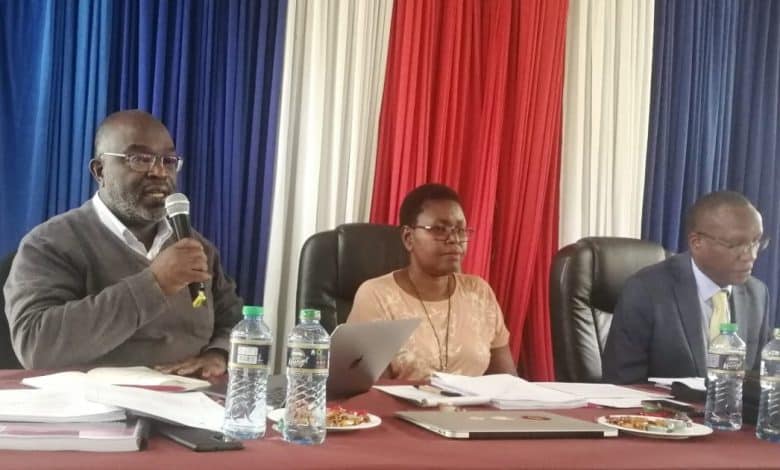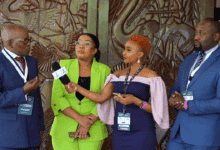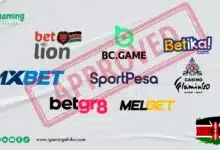Presidential taskforce on Formation of national lottery Merits Explained

According to the Kenyan Presidential Task Force on Establishing a National Lottery, the funds that are raised will be used to fund a number of charity endeavors, such as sports programs, the arts, business support, and emergency response to pandemics, fires, and floods.
On Tuesday, the taskforce claimed that in order to discover the best practices for managing the planned lottery, it had compared itself to other nations that had operated national lotteries for decades, including the US, UK, South Africa, and Singapore.
The proposed National Lottery will reportedly have a significant positive impact on sport, according to Mr. Erick Korir, a member of the Task Force’s Technical Committee.
In order to modernize the industry, the presidential taskforce is proposing to repeal the Betting, Lotteries and Gaming Act of 1966.
Mr. Korir pointed out that the Sports, Arts, and Social Development Fund, as it currently stands, has struggled to gather enough money for sporting events, necessitating the creation of new, non-governmental revenue sources that provide some relief to the taxpayer.
Despite the existence of public lotteries like the Kenya Charity Sweepstake and Win Lotto, Mr. Korir noted that Kenya does not have a national lottery while speaking at the Regional Commissioner’s plenary hall in Nakuru at a public participation session.
By selling numbered tickets and awarding prizes to owners of the numbers selected at random, a National Lottery is a State-franchised lottery that raises money for the performing arts, sports, and charitable organizations.
At the event, Kenyans from the counties of Nakuru, Laikipia, and Baringo shared their opinions on the drafts of the National Lottery Bill (2023), Gafmbling Control Bill (2023), and Gambling Policy (2023), which would serve as the foundation for the National Lottery.
The Gambling Control Bill (2023) primarily focuses on regulating gambling, as opposed to the National Lottery Bill (2023), which attempts to establish the National Lottery, National Lottery Board, and National Lottery Fund.
Crash Games Gaining Massive Popularity in Africa…… Read More
The goal of the Gambling Policy (2023) is to make gambling a force for societal advancement and to encourage responsible gaming.
Mr. Korir claimed that gambling was costing Kenyans billions of shillings while having no positive effects on the country’s economy.
Withholding tax on winnings from betting increased by 116.9 per cent from Sh 465 million in December 2021 to Sh1.008 billion in December 2022 reflecting significant growth potential. We are working on a framework that will guarantee responsible gambling. Current legislations that were created in 1966 to govern the activity are out of sync with technological advancements. The national lottery will be used to support good causes where the money will be used to benefit the people of Kenya.
he said.
Dr. Eric Aligula and Ms. Judith Kiragu were two additional Task Force Technical Committee attendees.
On March 17, President William Ruto created the 25-member Task Force, led by industrialist and billionaire Narendra Raval, to evaluate best practices, create policy, and lay out a strategy for implementing the National Lottery.
Gideon Thuranira (vice-chairman), Paul Russo, Anne Wakathiru Njenga, Grace Kamau, Abdillahi K. Mutwafy, and Jackline Chelangat Tonui are other members of the Task Force’s Steering Committee.
The taskforce Technical committee is made up of Wanjiku Wakogi, Dr. Aligula, Collins Kiprono, Peter Mbugi, Fred Mbasi, Geoffrey Malombe, Mr. Korir, Wilson Njenga, Catherine Ochanda, and Murimi Murage. It is headed by Linda Musumba. Clinton Mwita and Margaret Githaiga serve as the committee’s joint secretaries.
The government is represented by the Principal Secretaries of Treasury, Interior, Culture, and Heritage, as well as the Solicitor General and the Council of Governors.
The Vision 2030 Development Secretariat is the most recent organization to consider the proposal, forecasting a Sh500 million yearly cash injection into sports development through a proposed, doomed National Sports Lottery Fund. Attempts to establish a national lottery have always failed.
Mr. Korir noted that over 80 nations have adopted the use of national lotteries as a major source of funding for sports programs and the development of sports infrastructure.
In countries such as the US, National Lotteries are central to revenue mobilization by States who run popular lotteries such as Mega Millions and Powerball as designated National Lotteries.
he explained.
He emphasized that one of the factors considered in determining how to spend the revenues is whether or if people or organizations apply to the lottery fund to suggest how a portion of the monies should be distributed.
The lottery fund on its own motion will also be able to decide how to share out the proceeds to the selected good causes.
he said.
According to data accessible at the Betting Control and Licensing Board for the fiscal year 2022–2023, Kenya has 13 public lotteries, 56 public gaming establishments, and 105 bookmakers that have been properly registered.
Khaligraph Jones unveiled as new brand ambassador for 22bet…… READ MORE
According to Ms. Kiragu, with Sh202 billion in revenue in 2019, Kenya is the third-largest gaming market in Africa, behind South Africa and Nigeria.
She continued by saying that this clearly demonstrated the enormous potential for money generating in this industry.
Enacting legislation that would pave way for the National Lottery is certainly the right move to tap into this market for the benefit of the “hustler,”
Dr. Aligula outlined how the planned national lottery in Kenya would allocate 50% of its earnings to payouts, 38% to “good causes,” and the remaining 12% to administrative costs.
20 percent of the proceeds from the lottery will go to “sports, recreation, the arts, culture, and national heritage,” along with 40 percent going to “charitable causes,” 30 percent going to “economic empowerment,” 8 percent going to “signature transformation projects,” and the remaining 2 percent going to “emergencies.”
This is a good place to start as we look forward to public participation and hope Parliament fast-tracks implementation of the enabling legislation.
he stated.
According to Dr. Aligula, as part of the proposed changes to gambling laws by the Presidential Taskforce on the creation of a National Lottery, the government will divert a portion of the billions of dollars bet annually by gamblers into a required savings account modeled after the Hustler Fund, which is supported by President William Ruto’s administration as a means of encouraging Kenyans to save money.
The proposed amendments would also require internet gamblers to wager a minimum of Sh20.
In accordance with the new Gambling Regulatory Authority’s recommendations following consultation with the Interior Cabinet Secretary, the new Bill seeks to set aside a portion of the wagered amount for savings.
“A player in the online gambling activity shall not bet an amount less than Sh. 20 in a competition. The minimum amount shall be inclusive of such saving component for the player as shall be determined by the Authority in consultation with the Cabinet Secretary,” says the draft Gambling Control Bill.
Online bookmakers, online lotteries, and online casinos will all need to obtain licenses under the new regulation, which defines online gambling as any form of communication conducted through remote communication.
After the Hustler Fund, which has so far raised more over Sh1 billion, the Bill, which targets the millions of Kenyans who wager each year, is the newest tool used by President Ruto’s administration to enforce savings in the unorganized sector. If passed, the new Bill will take the place of the Betting, Lotteries, and Gaming Act.
The suggestion that bettors must make savings with each wager will increase the deductions and taxes imposed on the gaming and betting companies.
For instance, at the moment, wagers are subject to a 7.5% tax rate, while wins are subject to a 20% withholding tax.
However, the new proposals have kept the gambling tax, sometimes known as the betting tax, at 15% of the profits made by betting and gambling companies.
However, according to Dr. Aligula, businesses must still pay a monthly gaming charge to the gaming Regulatory Authority that cannot exceed 1% of the monthly total gambling earnings.
By allowing someone to participate in online gambling for less than the required Sh 20, he warned operators that they run the possibility of facing fines of up to Sh5 million or jail terms of up to six years.
The operators shall be tasked with registering participants in online gambling and putting in place measures to ensure that minors are not registered, including having to request for proof of age.
added Dr Aligula.
The operators will be required to set up a gambling control system that will record important operational disclosures, such as online security, safety and security against criminal activities, the online payment ecosystem, protection measures against gambling vulnerabilities and underage gambling, awareness and education, and responsible advertising.
Kwikbet Kenya review………Read More
The Communications Authority of Kenya (CA) and other pertinent government agencies will be able to access real-time gaming monitoring data thanks to the gaming Regulatory Authority’s assistance.
The draft bill continues, “Details of network connectivity with two links to mobile carriers shall be supplied to the Authority [CA] in the case of a mobile online gambling, lottery, or a betting licence.
Operators must pay out cash prizes within two days, while non-cash prizes must be paid out within seven days.
Mr. David Mbevi, the deputy county commissioner for Njoro, highlighted that irresponsible gambling has destroyed lives and may do so in the future if it is not curbed.
While there is nothing fundamentally wrong with gambling, according to the administrator who spoke on behalf of Nakuru County Commissioner, there is an urgent need to slay the dragon of gambling addiction in our culture.
We need to act fast before it is too late. The proposed laws will do more in terms of regulating the industry to curb the current obsession with betting.
added Mr Mbevi.
editor@igamingafrika.com
Subscribe to our channel on Telegram here for timely live updates on all happenings in the iGaming space in Africa. You may also join our group on Telegram here and grow your networks by interacting with all players in the iGaming sector in Africa























